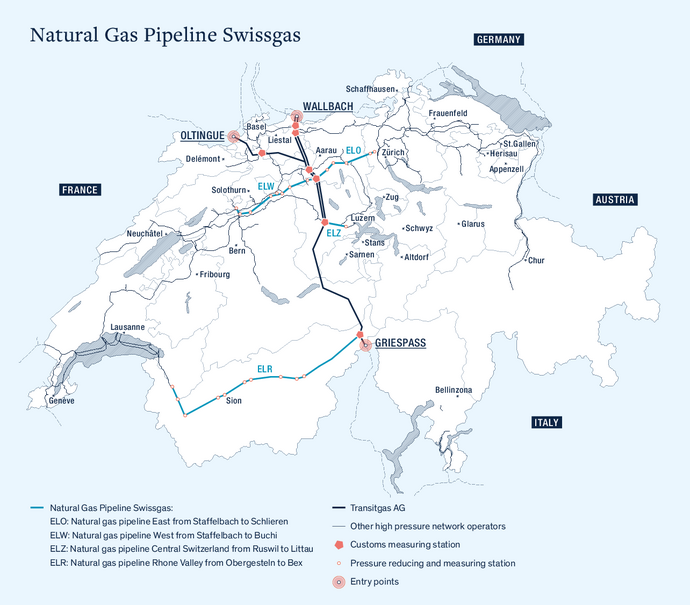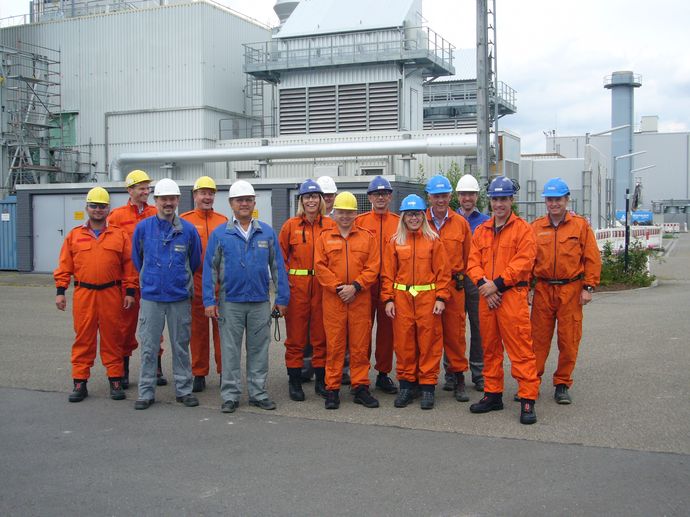The goals of Asset Management have always been to protect people and the environment and ensure the security of supply. The new gas market requires an operating system that can proactively control costs and offer shippers optimised grid payments.
Switzerland is directly integrated into the European natural gas network. As a result, it is increasingly important to coordinate, plan and schedule maintenance activities with upstream and downstream network operators so that the network downtime is minimised. This is based on a operations management system which ensures the operating permit issued by the Swiss Federal Office of Energy.
Operation and maintenance
Swissgas strives to further develop its maintenance strategy to guarantee optimum availability at the lowest network costs. Low grid payments guarantee competitive prices for natural gas customers and safeguard the position of natural gas as an energy source on the heating market.
Swissgas’ top goal is safe technology, both for the environment and for its employees. It has established a system of occupational safety that complies with legal requirements and is regularly adapted to the state of the art. Swissgas regularly shares experiences and ideas with foreign high-pressure pipeline operators at international conferences and workshops.
Coordination tasks
Along the transit gas pipeline, Swissgas operates six metering stations where natural gas is fed into the Swiss high-pressure network. The quantities of natural gas must be recorded exactly and the gas throughput monitored and coordinated with the Swiss Customs Authority.
Since 2013, natural gas as an energy source and the high-pressure network have been subject to the Swiss Major Accidents Ordinance.
Swissgas supports the aim of risk prevention for the public and the environment. Together with Swiss Federal Office of Energy (SFOE), Federal Office for the Environment (FOEN), the cantons, the high-pressure network operators and public safety organisations, a nationwide concept was developed that guarantees the best possible management and bundling of emergency personnel in the event of deployment.
Representation of interests
Swissgas assumes responsibilities as an industry representative of the Swiss high-pressure network operators and serves as the contact for government authorities involved in operations. The regulatory authority is the Swiss Federal Office of Energy together with the Federal Pipelines Inspectorate (FPI).
Swissgas also sits on national and international committees, representing its own interests and those of the regional companies.
Although Switzerland is not a member of the EU, the European technical regulations are also binding for Switzerland. As a result, the Swiss high-pressure network operators are interested in having Swiss requirements incorporated into the European regulations and establishing specifications and information from the European standards in Switzerland.
Controls / monitoring
The Swiss Federal Office of Energy (SFOE) is the supervisory authority for natural gas high-pressure pipelines and the FPI is responsible for conducting inspections on its behalf. Swissgas is required to provide evidence of maintenance and operating activities as well as the ensuing integrity of the pipelines and systems to the FPI. This includes, for example, pipeline inspections, system maintenance, inline inspections (pigging), functional tests of valves, verification of cathode corrosion protection and alarm and deployment drills.
The effects of nature on the natural gas pipelines also have to be monitored, for example, the impact of climate change such as melting permafrost. This ranges from safety measures to adjusting the pipelines or routes.
Swissgas always has to balance the conflicting interests of efficient operation with optimum system availability and reliability, taking into account all legal regulations.
Swissgas relies on various monitoring systems to document inspections and maintenance on pipelines, metering stations and auxiliary systems:
- Periodic pipeline inspections on the ground or by helicopter
- Periodic system inspections
- Construction site monitoring to guarantee construction safety
- GIS: Geographic Information System$
- Property owner database
- Pipeline screening
On behalf of the Swiss high-pressure network operators, Swissgas centrally monitors and manages the relevant Swiss and European standards and provides information on changes to regulations and their impact on Swiss high-pressure network operators.
Building applications
Third-party building applications are now submitted directly to the Swiss Federal Pipeline Inspectorate (Eidgenössisches Rohrleitungsinspektorat, ERI).

